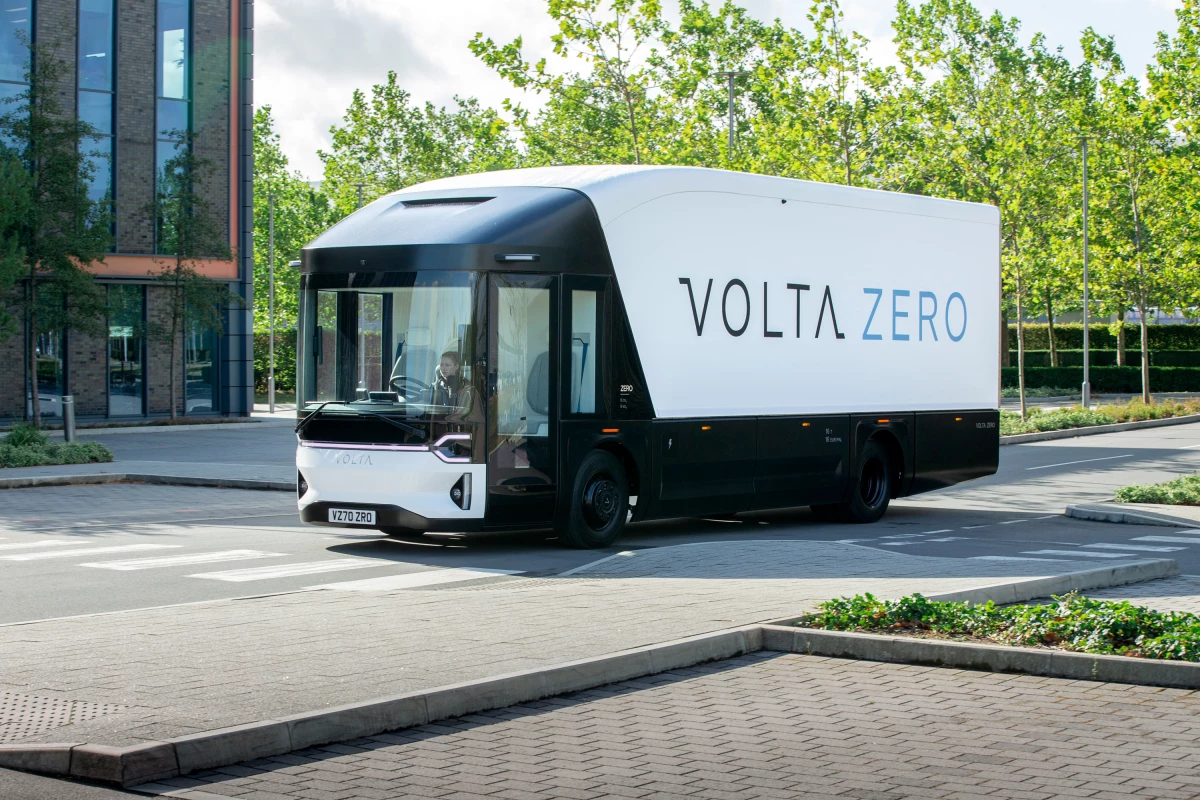Back in July, Volta Trucks released some specs and rendered images of its upcoming Zero electric truck. Now the start-up has revealed the first prototype, with trials due to start next year ahead of full production in 2022.
Specifically designed to meet the needs of inner city parcel and freight carriers, the 16-tonne electric truck has a limited top speed of 90 km/h (56 mph) and a 160-200-kWh battery pack for up to 200 km (125 mi) of per charge range. It offers package and freight movers 37.3 cubic meters (1,317 ft3) of space in back (enough to accommodate 16 Euro pallets), for a payload capacity of 8.6 tonnes (9.6 tons).
The driver is seated in the middle of the cabin on a swivel chair, and lower than conventional trucks at around 1.8 m (6 ft), which is said to enable easier visual communication between the driver and those around the truck. There's a central display inside with touch screens to the side for controlling lights, navigation, route planning, aircon, comms and entertainment, and the driver is treated to a 220-degree view through the large windows designed for optimum visibility and blindspot reduction, and to achieve a Transport for London five-start "Direct Vision Standard" rating.

Rear-view cameras are used in place of traditional side mirrors, a 360-degree camera also gives the driver an all-around perspective, and there's an object detection system employed to the sides of the vehicle to let the driver know when another vehicle, pedestrian or other road user might be hiding in a blindspot. Sliding doors on either side of the cabin cater for quick ingress and egress on busy or narrow streets.
Volta is promising the latest driver assistance systems will be installed, such as road sign recognition, a reversing camera, lane change assist and lane departure warning, as well as active steering. And fleet operators will also be able to tap into an AI-assisted monitoring system to help keep the vehicles on the road for longer.
The startup is reported to be the first all-electric commercial vehicle manufacturer in Europe to make use of e-Axle technology. This sees the electric motor, transmission and axle contained in a light and efficient single unit, while the lithium iron phosphate battery pack is located between the chassis rails and will be modular to allow Volta to tailor the trucks to an operator's specific needs.
Exterior body paneling, some of cab's interior trim and its body panels are made from flax fibers and biodegradable resins. The flax weave was developed by Switzerland's Bcomp, in partnership with the European Space Agency, and is said to match carbon fiber for stiffness and lightness, but uses 75 percent less CO2 to produce. This weave is then combined with a resin derived from rapeseed (canola) oil by the UK's Bamd and formed into the panels. Volta says that the combination of composite body panels and the metal spaceframe cab structure affords the same crash and safety performance as the steel used in conventional construction.
The 9,460 x 3,470 x 2,550-mm (372.4 x 136.6 x 100.3-in) Zero can be had with an optional refrigeration unit, too, without altering its dimensions, which is powered by the same battery as the drivetrain.

"Commercial vehicles form the lifeblood of commerce and livelihoods in cities, but today’s large trucks dangerously impose themselves on our streets and dominate their surroundings," said Volta's CEO, Rob Fowler. "With the launch of the Volta Zero, we are changing the face of road transport. Volta Trucks is redefining the perception of the large commercial vehicle, and how it operates in and integrates with, the zero-emission towns and cities of the future.
"This is made possible by the three pillars that define both Volta Trucks as a business and the Volta Zero - safety, sustainability, and electrification. Add to that our unique Truck as a Service proposition that reimagines a fleet manager’s business model. At Volta Trucks, we are directly contributing to society’s migration towards an electrified future."
Volta says that it's already received orders from early adopters, and is looking to start trials with "some of Europe's largest parcel delivery and logistics companies" in the first half on 2021, with the first vehicles expected to roll off the UK production line the following year.
Though no price tag has been mentioned, Volta reckons that because the Zero uses 90 percent fewer mechanical parts than an equivalent internal combustion engine vehicle, the total cost of ownership will be on par with a diesel-powered truck.
Source: Volta Trucks







